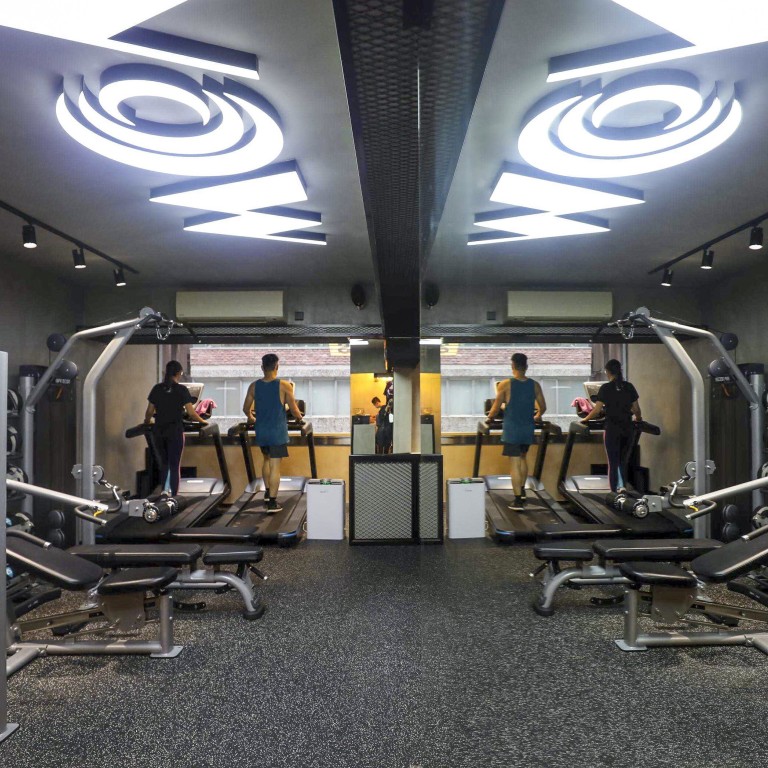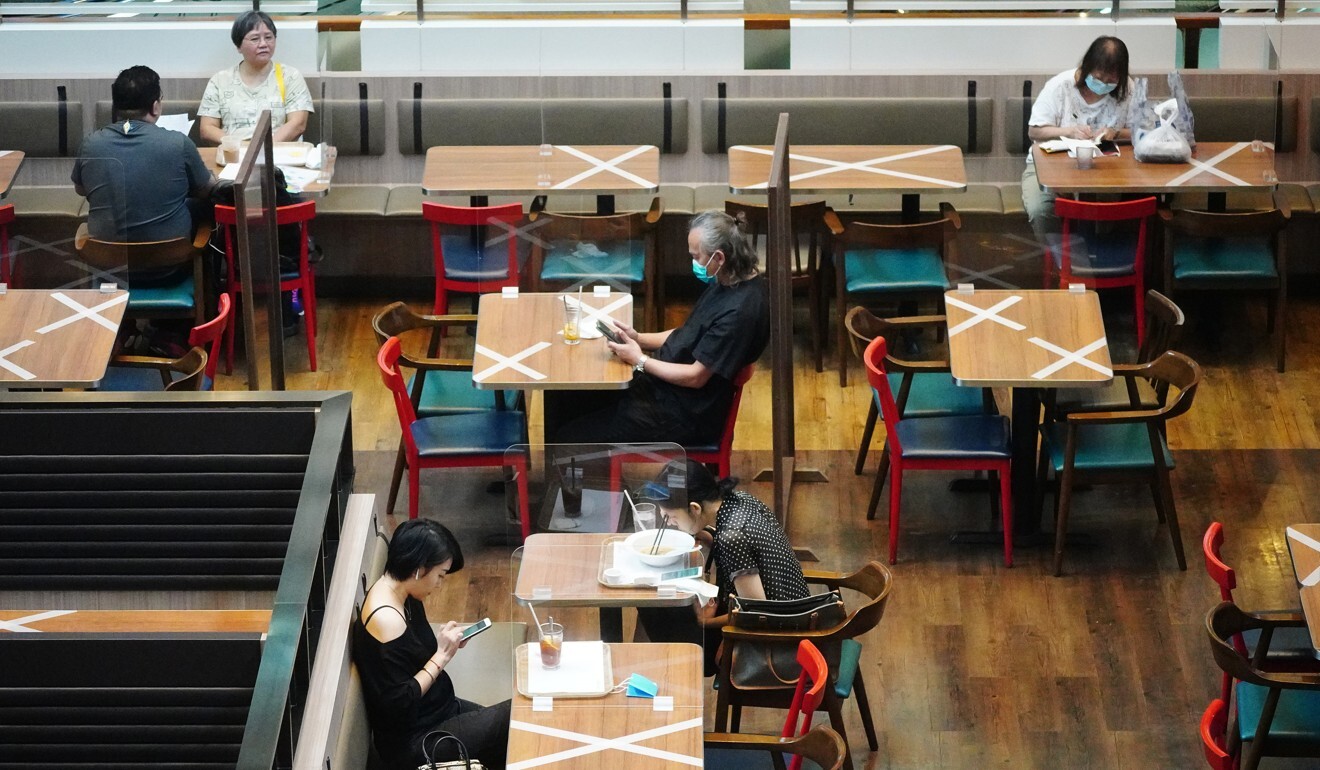
Hong Kong relaxes social-distancing rules as city confirms lowest number of new Covid-19 cases in nearly two months
- Dine-in hours at restaurants to be extended by an hour, while gyms to be allowed to reopen from Friday
- Eight new infections confirmed on Wednesday, the lowest since five were reported on July 3, but two cases linked to Mong Kok hotel cause concern
But despite signs of the coronavirus crisis easing, the government cancelled the annual National Day fireworks display on October 1 because of the pandemic, the second time in a row after it was called off last year due to the city’s social unrest.
Although just eight new infections – all locally transmitted – were confirmed on Wednesday, a small Covid-19 cluster of two cases emerged at the Metropark Hotel in Mong Kok, one of whom was an 87-year-old man who was found to have the virus after his death.
Nine residents, some hotel employees and mortuary staff would have to undergo quarantine because of the case. The incident also raised concerns as to whether mortuary workers had received enough training on when to wear protective gear.

The new infections, the lowest amount since five new cases were reported on July 3, pushed the city’s tally to 4,830. Two other male patients, aged 66 and 79, died on Wednesday. Along with the 87-year-old patient from the hotel who was given a post-mortem diagnosis, the total number of fatalities linked to Covid-19 stood at 93.
Meanwhile, none of the participants in the mass screening programme, which started on Tuesday, had tested positive as of Wednesday morning. By 8pm, about 798,000 people – more than 10 per cent of the entire population – had registered online for the voluntary programme.
Pressure also mounted on the government to treat garbage from the 141 test centres citywide as clinical instead of domestic waste.
“The coronavirus is very tricky, thus we have to be careful when resuming social gatherings to avoid a resurgence of cases,” Secretary for Food and Health Professor Sophia Chan Siu-chee said.
“But we also have to care about the mental health of the overall public, thus allowing some relaxation when it’s possible and safe.”
Confirming an earlier Post report, Chan said gyms, sports premises, clubhouses and massage parlours would be allowed to reopen from Friday, though gym-goers would have to wear masks while exercising. Beauty parlours and cinemas reopened last Friday.
126,000 take Covid-19 test as Hong Kong’s mass screening scheme has ‘smooth’ start
While most establishments would still have to abide by rules limiting gatherings to two people, groups of four would be allowed in gyms and some reopened sports premises, including badminton and table tennis courts, bowling greens and tennis courts, as masks would be worn during the activities, Chan said.
Clubhouses are also allowed to resume business, but bathrooms, swimming pools, karaoke and mahjong areas within the establishments have to remain closed.
“We have extended [restaurant dining] by one hour, because we listened to many citizens telling us it’s a bit rushed to have dinner as Hong Kong people tend to work late. So slightly extending [dinner time] by an hour serves this purpose,” Chan said.
Outdoor sport areas such as bicycle parks, riding schools and water sport centres would be allowed to reopen as well, while basketball courts and soccer pitches had to remain closed because contact sports were considered riskier, Secretary for Home Affairs Caspar Tsui Ying-wai said.
He added the bureau was discussing with the Hong Kong Football Association about the possibilities of creating a “sports bubble” – a concept that some foreign countries had been practising – to allow teams to practise or even join competitions given that players had to go through constant virus testing and stay at home or in camps unless they went out to practise.
“It will be good to see if sport activities can resume in a gradual manner … by allowing some of the soccer teams to practise together, and so that competitions may resume in the near future when the coronavirus situation remains stable,” he said.

03:13
Hong Kong launches universal Covid-19 tests for residents
The Hospital Authority, meanwhile, said the first of Wednesday’s fatalities was a 66-year-old man who was admitted to Yan Chai Hospital on August 2 with a persistent fever and cough. The other was a 79-year-old man with chronic illness admitted to United Christian Hospital on August 9.
The two confirmed Metropark cases – both of unknown origin – involved two residents who stayed on the same floor, sparking concerns over whether there was transmission within the hotel.
The 87-year-old man had lived at the hotel for a few months with a friend, who found he was suffering from dizziness last Thursday. His condition deteriorated and he died in hospital. The man’s body was moved to Kwai Chung Public Mortuary, but staff handling it did not wear full protective clothing.
Respiratory specimens taken after his death tested positive for the coronavirus on Tuesday night.
Five workers involved in moving the body were required to undergo quarantine, with one already showing symptoms, said Dr Chuang Shuk-kwan, head of the communicable disease branch at the Centre for Health Protection.
She said there were protocols governing the protective gear workers collecting corpses had to wear, and those involved in this case were not dressed sufficiently. The Department of Health and the Food and Environmental Hygiene Department, which hired them, would hold a training workshop for workers on Friday.
The other infected hotel resident was a 70-year-old retiree who returned from Taiwan in July, but he had tested negative twice for the coronavirus during the quarantine period, so health authorities believed his infection was not imported.
What you need to know if you’re getting tested for Covid-19
“Both cases coincidentally lived on the same floor but preliminary investigation found that they did not know each other,” Chuang said. “But we will try to test the staff and residents to see if there are more cases.”
The other two cases of unknown origin involved a 45-year-old renovation worker at Disneyland, and a 61-year-old man who worked in Tai Wai.
Two more new patients, both aged 36, were linked to the cluster at Hong Chi Lei Muk Shue Hostel in Kwai Chung, taking the total number of cases there to 22.
Among those who joined the city’s universal testing scheme, not everyone liked the idea of further relaxing social-distancing measures.
Tang Siu-lan, a homemaker in her 60s, said the measures should remain for some time, as the situation was not under control.
“It was so scary during that time [when there was more than 100 cases per day]. I have a grandson in his early teens. If you relax too early, people will become complacent and gather,” she said after being tested at a Ma On Shan centre.
“People are funny. When you relax the measures, they will be relaxed in their hearts. I think we should have waited until our universal testing is finished and the results of it are out.”
But Lee Ka-yiu, a 24-year-old university graduate, said he was happy that gyms were reopening.
Hong Kong residents explain why they either join or avoid mass Covid-19 test
“If you wear a mask and the gym is cleaned thoroughly, then it wouldn’t be a problem with outbreaks,” he said, adding that he thought gyms should limit the number of people exercising.
Professor David Hui Shu-cheong, one of the government’s health advisers, said if the number of infections remained consistently low, the government could allow four people per table at restaurants.
“But all this lifting of measures must be gradual,” he said. “If we allow a relaxation of all measures at the same time, the public might think we are already going back to normal, and they will all go out for public and social gatherings.”
Dr Leung Chi-chiu, a respiratory medicine specialist, said the number of infections had dropped considerably from the peak in July.
“I think it is appropriate to relax some of the social-distancing measures,” Leung said, stressing that residents should still be on their guard and wear masks as much as possible.
He also urged venues allowed to reopen, such as gyms and massage parlours, to limit the number of people inside and disinfect the premises every hour.
Additional reporting by Kathleen Magramo



